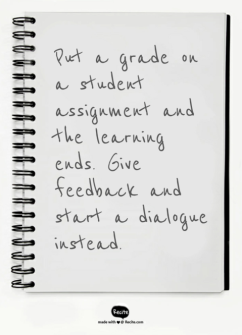
For too long we’ve allowed the system to stay as it is just because that’s the way someone decided it should be.
But what if that decision, made so many years ago, just doesn’t apply to learners in today’s paradigm?
Then educators have an obligation to amend it to suit our kids better.
Over and over again, the concerns heard have more to do with systemic challenges and parental beliefs than they do with sound pedagogical practices. Teachers, as experts in our field, must speak louder than the dissenters to help them understand why this is a better way.
We can all agree on the necessity of communicating learning with our students and parents and even school stakeholders for the sake of data, but what we don’t agree on is what that communication should look like. Traditionally, we’ve used a grading system that works out of 100, adding or taking away points for a variety of reasons that have little to do with achievement. Or using arbitrary letters, uncalibrated, allowing deficient life skills to detract from the demonstration of growth.
Because obviously if a student doesn’t come to class he or she can’t be learning or if no work is turned in, then no aptitude achieved.
No longer can we allow students to play school and each of us a cog in the wheel to make that work. If we work together, agree that feedback is a better way than putting a grade on something, then we start there.
Consensus.
Too often, the students who don’t play school well, are quite bright but their natural inclinations are squashed so early they learn to hate the institution of school instead of developing a passion for anything that drives them individually.
The reason why standardized testing exists and even functions in this society is because every school environment is different and standards are challenging to universally endorse. So big data companies out there capitalize on our human error, all the while minimizing student talent and innovation.
To truly be 21st century ready, the skill sets we need to instill in students aren’t about compliance, they are about creativity. Fostering a culture of productive failure that produces growth and encourages later success. Every great inventor or thinker knows the value of breaking rules to go farther and now is our time in education.
We each must stand up and admit that the traditional grading system lies to students. Testing students in only one diminishes their natural capacity for growth and miscommunicates what they know and can do. It’s time to listen to kids and adjust our practices so the learning never ends. If we don’t place a letter or number grade on learning, we can embrace the skills and continue to practice them until mastery is achieved.
Mastery must be a goal, not an A or a 100. We all know that if any student gets those the instant gratification is fast and then their memory of the learning begins to dissipate. The focus of grades takes the focus off of the learning.
Let’s take learning back.
What will you commit to, to make school about learning and not about grades? Please share